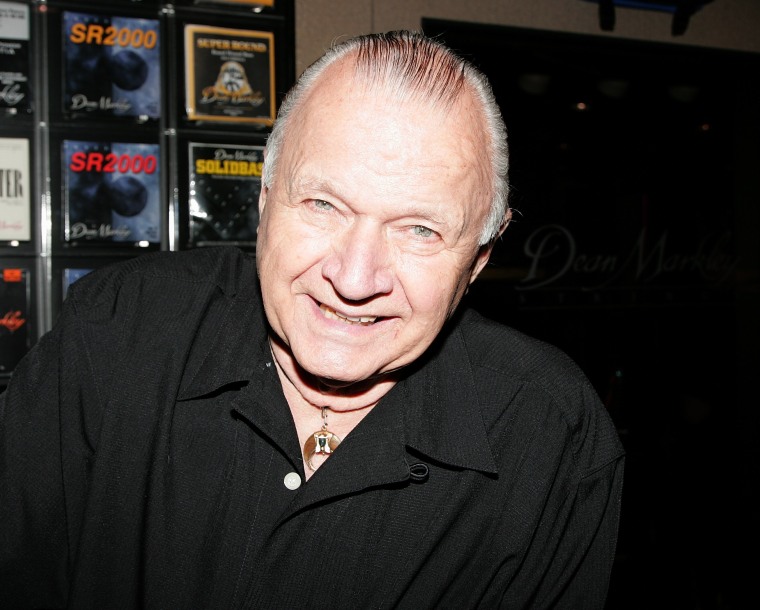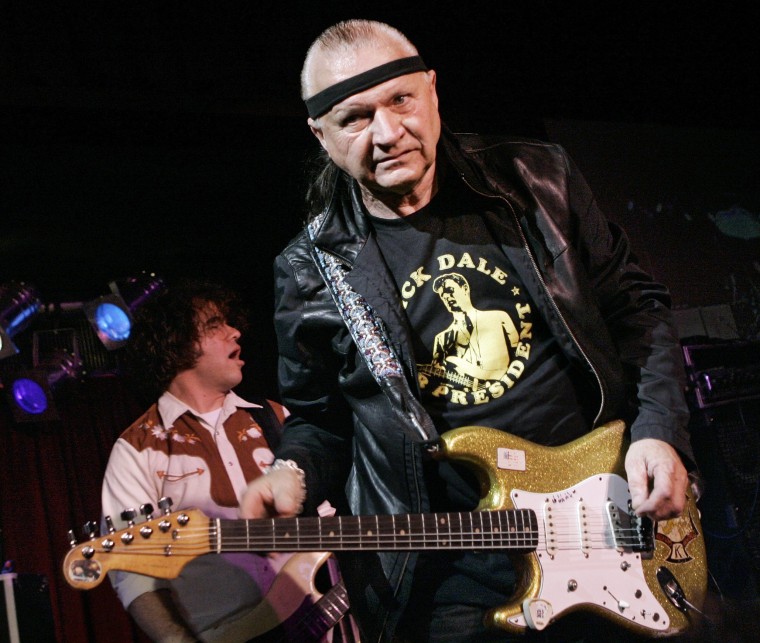Dick Dale, universally hailed as the king of the 1960s surf guitar sound that heavily influenced the development of rock 'n' roll guitar — and of rock 'n' roll guitars themselves — has died at age 81. He had recently been in treatment for cancer, from which he had twice previously recovered.
Dale's death was reported by The Guardian and confirmed on Facebook by Dusty Watson, his former longtime drummer. No cause of death was immediately reported.
Dale — who played his guitars left-handed and upside down, with the bass strings on the bottom — added Middle Eastern and Mexican strains to the melodic patterns of 1950s instrumental rock. Then he and his band, the Del-Tones, cranked up the reverb and speeded it all up to rocket pace, creating a loud, fierce sonic attack famous for overpowering amplifiers, which would, on occasion, literally explode or catch fire on stage.

Dale was close friends with Leo Fender, the inventor of the Stratocaster, which helped to revolutionize rock guitar, and together, they invented the first 100-watt amplifier to handle the input with which Dale had destroyed an estimated 48 standard 30-watt boxes, according to Fender's company.
"Dale and Fender would continue to work together on upping the ante, building a speaker cabinet that could house two 15-inch speakers to sustain his vicious riffage," the company said in a profile of Dale.
Dale's attack — which was a punch to the gut of instrumental rock during the early 1960s — inspired artists as varied as The Beach Boys, who added impeccable vocals to the surf guitar sound and who were for a while his opening act; Jimi Hendrix; Stevie Ray Vaughan; Eddie Van Halen; and Scott Ian, the guitarist for the thrash metal band Anthrax.
Guitar Player magazine dubbed Dale not only the king of surf guitar but also, controversially, the father of heavy metal. He is routinely included on lists of the most glaring omissions from the Rock 'n' Roll Hall of Fame.
Dale reached wide new audiences during the 1990s, when his hit "Misirlou," an amped-up, high-speed updating of a Mediterranean folk song, featured prominently in the soundtrack of Quentin Tarantino's cult hit "Pulp Fiction."
"Having 'Misirlou' as your opening credit, it's just so intense," Tarantino said as quoted in the rock critic Gary Graff's book "Pulp Fiction: The Complete Story of Quentin Tarantino's Masterpiece."
"It just throws down a gauntlet that the movie now has to live up to," Tarantino said.
Dale, who was born Richard Anthony Monsour, was credited with launching surf music in 1961 with "Let's Go Trippin,'" which was a major hit in the Southern California surf community for Dick Dale and His Del-Tones.
Their first full-length album, "Surfer's Choice," won the Del-Tones a contract with Capitol Records, and by 1963, they were appearing on "The Ed Sullivan Show," where a national audience got its first exposure to "Misirlou."
"I changed the tempo and just started cranking on that mother. And ... it was eerie," Dale told the Los Angeles Times in 1981. "The people came rising up off the floor, and they were chanting and stomping. I guess that was the beginning of the surfer's stomp."
The next year, Dale provided much of the soundtrack for the Frankie Avalon-Annette Funicello surfer movie "Muscle Beach Party."
Dale's popularity receded after the British Invasion of the mid-1960s, but he remained a revered figure among top guitarists until the end of his life.
"Few players ever have or ever will impact rock 'n' roll or the way the guitar is played the way he did," Nick 13, guitarist and frontman for the cult psychobilly band Tiger Army, said Sunday.
Michael Des Barres, the veteran rock singer and host of "Little Steven's Underground Garage" on Sirius/XM radio, who fronted The Power Station at the 1985 Live Aid concert, hailed Dale's "groundbreaking, trail blazing, garage shaking, surf riding brilliance" on Sunday.
Chuck D, the rap pioneer and leader of Public Enemy, tweeted on Sunday simply that Dale was "DoPE."
A duet with Vaughan on the Chantays' 1962 hit "Pipeline" in 1987 was so incendiary that it has attained mythic status among Dale's fellow guitarists:
Dale had many health issues late in life, which he recounted in 2015 in an interview with the Pittsburgh City Paper.
Dale said he was embarking on a 25-city tour that summer because he needed the money to pay his medical bills.
"I have to raise $3,000 every month to pay for the medical supplies I need to stay alive, and that’s on top of the insurance that I pay for," he said, adding:
"When I'm on stage, the pain can be excruciating. Someone has to help me up on stage, because I can't do it alone. There's a part of my show where I play drums, and my drummer pulls my arm and my roadie pushes my butt to get up there. But I get up there."

